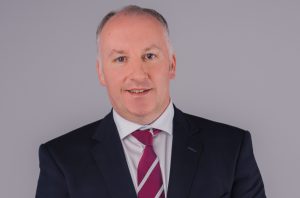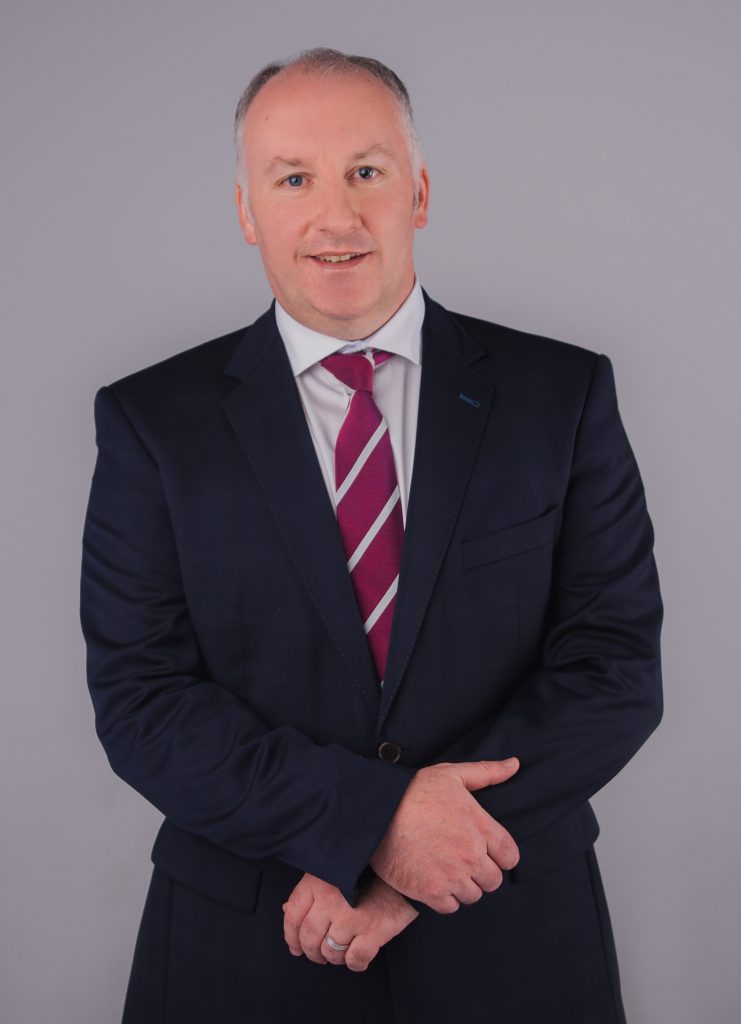Linesight started life as Bruce Shaw in Ireland 40 years ago as a small cost and project management company – predominantly quantity surveying. Times were tough in 1980s Ireland but the government introduced tax incentives that eventually attracted large US corporations. Working with these multinationals was the start of a journey that would take Linesight beyond Irish shores. Over the past 12 years the company has expanded internationally and now has 17 offices around the world.
Niall Greene, Managing Director Middle East, spoke to Jason OConnell about the companys journey and where it goes from here.
What does Linesight offer its clients?
Our primary service offering is cost consultancy and project management. Having been in relationships with some of the large multinationals, we had to expand our offering because they were looking for us to do more. So we had two choices. We could either curtail our service or expand it to compliment them and at the end of the day its all about meeting the clients requirements. So we expanded our scope of services to programme management, development management, project controls and then the cost consultancy all of those complimentary to each other.
each other.
In the last couple of years weve found theres a demand for services here that we were offering back in Europe when we were dealing with distressed projects. Banks have released significant funding to the market and they dont know when theyre going to get their money back or whether it has gone to the project theyve funded. Has it funded other projects that the contractor or indeed the developer has started? So one of our growth areas in the last 18 months has been in that area of due diligence of projects.
When did you come to the Middle East?
I came out here at the back end of 2008. At that stage we were predominantly an Irish business and its only in the last few years we started to expand into the International market.
Unfortunately 2008 was when everything fell off a cliff. We had two options: to go home or to stay. So we moved our focus to Abu Dhabi but that never really took off. We were faced with a number of tough choices. Whether to develop locally within the UAE or branch out. We decided to look at Bahrain which was going well at the time but at the end of 2009 that went through a difficult period as well.
Saudi Arabia was still going strong so we got involved there on a large KAUST university project supporting them on the cost and the close out of some of the major contracts with Saudi Oger and Saudi Binladin. That gave us a foothold there and over the last eight years KSA has been the strongest market in the region for us.
Dubai came back strong in 2011 and we got engaged on a couple of large projects such as the W Hotel on the Palm Jumeirah which gave us a good foothold in the hospitality sector here. We now have a number of large scale hospitality projects in the region such as the Four Seasons in Bahrain and the Katara 800-bed hotel in Qatar and were doing a variety of hotel projects in Mecca.
Which sectors do you focus on?
Some of our competitors cover several sectors whereas we are very focused on sectors that we know were good at and know we can add value. Those would include the tier one sectors such as hospitality, healthcare and technology/life science. Weve done a lot of data centres here, for example. Weve done a lot of hotels and right now were doing the two largest healthcare projects in the region one in KSA and one in the UAE.
Around 75 percent of our turnover in recent years has been on the basis of repeat business with clients. We have clients that started out with us back in Ireland 30 years ago such as Microsoft and Hewlett Packard and were still working with them globally. Were in the business of identifying key clients and developers where we know they have a good history of paying consultants and we have a history of delivering good key projects.
How many people work at the company?
We looked at this and whether to grow organically or through acquisition. The model we chose was to employ very senior guys. At the moment we have about 500 senior execs within the organisation. Were not in the business of hiring lots of lower cost people, its a different service. Yes it impacts on fees but were going after a different market as a business.
What was the thinking behind the name change to Linesight last year?
Bruce Shaw was a very strong brand but we needed a new brand to bring us on the next part of our journey of expansion. In order to continue to grow we needed a brand that we completely owned globally. There was a small practice owned by a guy whose name happened to be Bruce Shaw doing the same business. If you work with large multinationals and they do a search on you and they find a few Bruce Shaws that doesnt help so we needed another name. The Linesight name is now legalised in 40 countries.
We surveyed our clients and got feedback saying that were a very safe pair of hands and the right guys to go to at the start of a project. So we came up with the idea of Linesight, from the concept of looking through a telescope and having a clear and consistent vision to bring you on that journey. We provide a client with a select number of services or an all-encompassing service. We try and work to a flexible model to clients.
Whats your outlook for the year ahead?
Theres no question 2016 has been a difficult year across all markets, especially in Saudi Arabia and even Dubai has been a flat market but I do think we should see around Q3/Q4 this year that the market will recover very strongly and certainly here in Dubai with 2020 coming we should see enhanced construction activity. There are already signs of that with a significant number of government announcements in the past six months.
We hope to grow by another 20 percent this year with major growth in the US and Asia. We expect to grow by around 4 to 5 percent here. We see strong growth from 2018 onwards so on average over the next five years we should see 12-15 percent growth.
The people that will give you a good indication of where the market is going are the funders who we are supporting with their due diligence. They are putting more and more influence on projects to make sure the feasibility stacks up, the procurement strategy is workable, the availability of contractors is there, etc. They are asking far more questions now about how a project will be built and how the income stream is coming into projects. They are building more confidence into the project financing. Lenders have been badly burnt in the past so now theyre being far more rigorous.
Will that continue even when the good times return?
I think so, yes. Developers also increasingly need our services because they are under pressure from funders. The clients used to be able to go in with a two page report but now they have to go in with a properly detailed and thought out plan. That can cause delays in projects but were delighted with that in some ways because all of the hard decisions are being made at the beginning and they are creating a proper strategy. So thats one thing that gives us some level of comfort that the UAE market will rebound in the second half of the year. Overall the outlook for the region is not overwhelmingly positive but its not negative either. Were here for the long haul. We came here at a difficult time so the experience we gained then is helping us now.
Whats the biggest challenge for the industry in 2017?
Everyone needs to be selective about who they work with. For example, some contractors are underpricing projects and buying turnover. The client might see that as being very attractive but hes only buying a bag of stress in our opinion. Some of our own competitors are even buying turnover. The feedback from that is that some clients are getting bad service. We would rather not do a job than do a bad job and get a bad name.
What are the key trends to look out for this year?
Project financing will be key, particularly in markets like Saudi. We are talking with the government about ways of generating project delivery and the obvious one there is project finance and using a PPP or PFI type of model which has been successful in Europe and has been used for a number of projects here in the GCC region. For example, Medina Airport was developed into a PPP model and theyre looking at widening that now to education and healthcare projects in Saudi. It could be a success but the challenge around that is the risk. The guys putting up the finance need to make sure that the risk is shared evenly.
Where are the big opportunities for you?
The oil crisis wont be there forever and in Dubai theres a lot of major projects in the pipeline with 2020 coming and in Qatar with 2022. Were advising in KSA on the 2020 vision and there is a lot of real thought being put into initiatives to stir a recovery in the absence of oil as funding. It wont happen overnight but over the next 18 – 24 months there will be some real opportunities emerging in Saudi. Its an enormous economy with a young population thats growing and they need major infrastructure just to sustain the organic growth of the economy.
Hospitality will be a growth sector here in the region and particularly in the UAE. We are working on a number of large scale projects to the tune of 6,000 to 7,000 hotel rooms at the moment at early stages of pre-concept. These are mainly 4 and five star hotels. We have one very exciting project in Mecca with 106 hotels thats part of a new district for pilgrims. Youd never see anything like it anywhere else in the world. Its going to be a 10-year development plan supported by the government because of course this type of tourism is an alternative source of income.
Is Qatar on your radar?
Weve done some work in Qatar but our strategy was to hold back because of issues with payment. We have one major project there and we are suffering a little bit on that. There is good opportunity on infrastructure but that isnt a sector that were pushing here in the region. There are project delays and if youve got people on the ground there and youre paying out salaries and theres no money coming in from the client then thats a problem. It was on the agenda about five years ago to open an office in Qatar but when we looked into it a bit more we decided to focus on the markets where we have a strong presence which is Saudi, Bahrain and Dubai. We are doing work in Kuwait and we are looking at Oman but right now we are focusing on those three markets which have been good to us.

